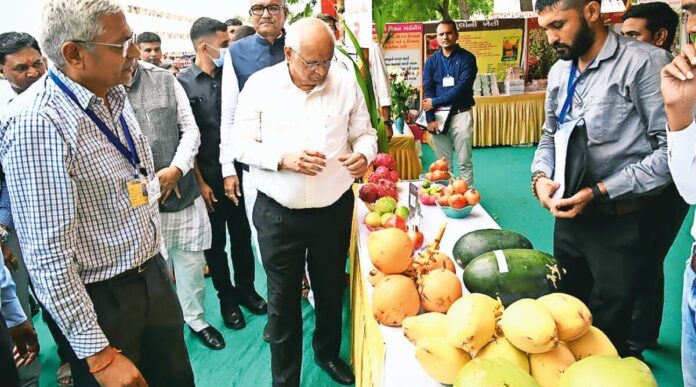The Chief Minister’s speech
He said, “Applying fertilisers is a labour-intensive process. Additionally, farmers have to spray pesticides to protect their crops (from pests). Generally, labourers apply fertlisers and spray pesticides. Drone technology will offer solutions for all such tasks. Additionally, we will find in drone technology the solution to the issue like shortage of labour.” He further added, “The government has earmarked Rs 35 crore and a target of covering 1.4 lakh acres under this scheme has been set.”
Laying of foundation stones
He was in Mavapar village in the taluka Dhrol of the Jamnagar district to lay the foundation stone of a CoE (Centre of Excellence) for horticulture. It was then he addressed a public meeting and discussed the plans. Later he laid the foundation stones of similar CoE-Hs virtually in Mahamara village in the town of Kapadvanj of Kheda district and in the town of Daskroi in Ahmedabad simultaneously. The CM laid the foundation stone of a PPC (Primary Processing Center) for horticulture crops as well in Mavapar itself. He also laid the foundation stones of similar PPCs for horticulture crops virtually in Deesa town in Banaskantha, in Khandivav village in the town of Jambughoda of the Panchmahal district, and also at Kukma village near Bhuj in Kutch. Patel addressed the farmers by saying, “Our objective is to see to it that farmers adopt modern farming practices so that agriculture becomes increasingly profitable and farmers’ income goes up. The primary (processing) centres being set up today are a step of the state government to create a value-addition chain in horticulture crops.”
Defarmss about CoEs
CoEs are model nurseries and demonstration farm that are being set up by the state government with the aid of Israel under the Indo-Israel Agriculture Project. As per the agreement signed between the government of India and Israel, the latter is offering technical know-how and required inputs such as seeds, etc. The state government of India on the other hand is offering resources like land, fund, and manpower for such establishments. These centers would have a seedling/plant nursery, a farm for demonstrating the best techniques of cultivation, fertigation and irrigation systems, etc. With the addition of three new CoEs, the state now has 10 such facilities. The CM said, “These (primary processing) centres will provide services like grading, sorting, packing, storing, cold-chain, primary ssing, etc.” These PPCs are launched for the first time ever in the history of India by the state government.
Expenses and other promotions
The officers of the state horticulture department said that each PPC will cost approx. Rs. 5 crores to be developed and the CoEs will need Rs. 3 lakhs each. The CM felt grateful for the conducive policies of the state government leading to the increase in the production of horticulture crops manifolds in the last two decades in Gujarat. The director of horticulture in Gujarat, Mr. Parsottam Vaghasiya, said, “We will hand over the PPCs to farmers producers organisations for operations and maintenance.” The CM on the other hand declared that the state government allotted Rs. 10 lakhs to promote beekeeping and honey production simultaneously in Gujarat. Speaking to the correspondent of The Indian Express, Mr. Raghvji Patel, Agriculture and Farmers Welfare Minister, said, “The acreage of dragon fruit is going up in Jamnagar. Therefore, the proposed CoE in Jamnagar will have this in mind even as vital fruit crops for Jamnagar are yet to be identified.” According to him, farmers of Jamnagar are adopting kamalam or dragon fruit quite fast eagerly.




